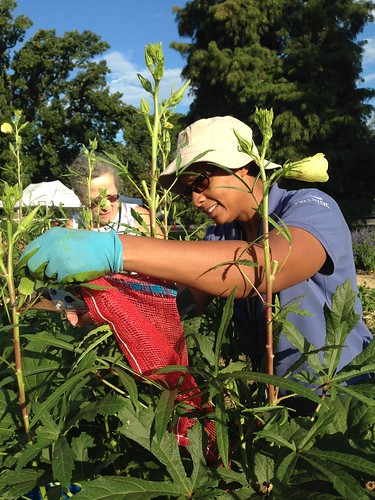29
Aug
USDA “People’s Garden” Turned Over to Agrichemical Corporations to Promote Pesticides and GE Crops
 (Beyond Pesticides, August 29, 2019) The Peoples Garden, located on the grounds on the U.S. Department of Agriculture (USDA) on the national mall, has been renamed and remodeled to highlight genetically engineered (GE) crops and farming techniques that directly counter the organic movement. The new exhibit, entitled “Voice of the Farmer,” is part of the “Trust in Food” initiative of Farm Journal magazine. This marks a continuation of trends in the Trump administration: pushing for GE/GMOs and pesticides.
(Beyond Pesticides, August 29, 2019) The Peoples Garden, located on the grounds on the U.S. Department of Agriculture (USDA) on the national mall, has been renamed and remodeled to highlight genetically engineered (GE) crops and farming techniques that directly counter the organic movement. The new exhibit, entitled “Voice of the Farmer,” is part of the “Trust in Food” initiative of Farm Journal magazine. This marks a continuation of trends in the Trump administration: pushing for GE/GMOs and pesticides.
Since 2009, the USDA Peoples Garden has highlighted organic agriculture. It was originally envisioned by the Obama administration as a place where visitors could learn about what differentiates organic from conventional chemical-intensive food production, and the practices used in organic land management. The garden had several different exhibits: the Three Sisters Garden, the People’s Garden Apiary, three green roofs, a certified organic vegetable garden, a tool shed with a rain barrel and green roof, wildlife and pollinator friendly landscaping, and a bat house. With an emphasis on sustainable gardening practices such as cover cropping, storm water collection, and composting, the garden served as a headquarters for numerous Peoples Gardens founded between 2009 and 2016. The People’s Garden and other projects of the Obama administration, such as their personal White House organic garden (not advertised as organic after push-back from the pesticide industry) and highlight the organic movement and the importance of organic practices to critical environmental and public health protection.
However, over the course of Trump’s years in office he has made strides to undo this work and instead highlight GMO crops. The new garden, “Voice of the Farmer,” takes the emphasis off of garden practices and instead focuses on industrial agriculture under the guise of connecting Americans with their food system. The new garden features screen based kiosks, a mobile app, and an interactive website to show videos of farmers extolling technology and pesticides.
The modules on the website provide very one- sided information combining images of clip-art cows and pigs with farmers discussing their practices. While one module discusses the importance of soil health and acknowledges that soil health can be destroyed in minutes, there is no mention of the role that glyphosate and other pesticides play in this process. While the module discusses in-depth the importance of cover crops, it fails to mention the importance of other sustainable and organic practices, such as soil testing, use of compost, and the importance of a healthy soil microbiome. Another module highlights seed and herbicide technology, claiming that these innovations have been central to “reducing the use of natural resources and creating an abundant, affordable food supply” with no mention of the downsides of pesticide drift or the increasing toxicity of U.S. agriculture to insects. Additionally, these products are not in fact essential to creating a food supply, as seen in numerous organic farms.
This shift in garden emphasis from organics to conventional large-scale agriculture is especially worrisome considering that an estimated 25 million tourists visit the area annually. That means that in the two years the exhibit will be on display, up to 50 million people will visit and interact with this new “farm” that hails pesticides and GMO seeds as integral to agriculture.
Beyond Pesticides supports the transition away from these conventional practices and toxic pesticides toward organic practices that promote plant resilience and decrease the need for toxic chemical use. As U.S. agriculture becomes increasingly toxic with increasingly lax regulations and the continued use of pesticides and other chemical-intensive practices, it is important to consume with a conscious and go organic in your own garden.
All unattributed positions and opinions in this piece are those of Beyond Pesticides.
Source: Food Politics










